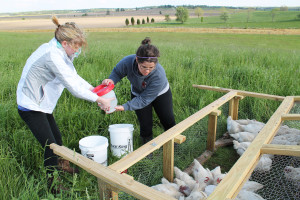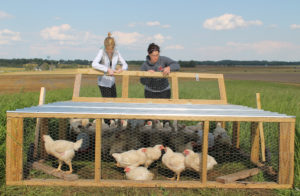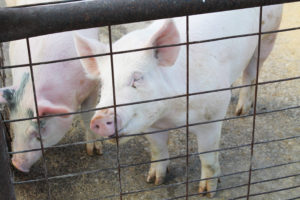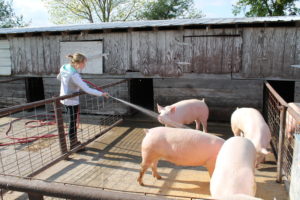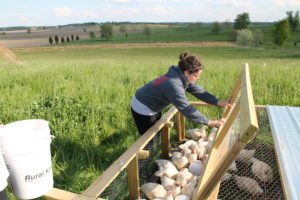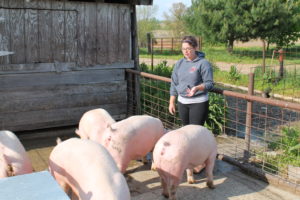Erica May noticed a lot of runny noses at first. She also became aware of the lazy habits of her heftiest client.
“He eats, he lays down. He eats, he lays down,” she said. She and her co-worker, Emma Thrasher, were devoted to the care of their clients, but both said they didn’t develop a relationship with them.
Emma Thrasher, left, hands a bucket of water to Erica May as she prepares to feed and water the broiler chickens in their portable coop.
“When you know the end is coming, you don’t get attached,” Thrasher said.
May, 26, and Thrasher, 20, were among 25 agriculture students at Owensboro Community and Technical College who spent this past semester caring for pigs and broiler chickens they helped raise at the Mount Saint Joseph farm.
“We come out twice a day,” May said on April 30. “In the morning, we feed the pigs, in the afternoon we also spray out their stalls so they’ll be clean. We also move the chicken tractors so the birds have fresh grass to graze on, then feed and water them twice a day.”
In the fall semester of 2014, the college contracted with the Ursuline Sisters to use three acres of farmland to allow students in its sustainable agriculture program to raise a garden of various greens and radishes. In spring 2015, the program expanded into livestock, although the cold and wet weather prevented a garden from getting started, said Chelsea Williams, assistant professor and program director of Agricultural Studies.
This chicken tractor was built by students in an agriculture maintenance class at Owensboro Community and Technical College, including these two, Emma Thrasher, left, and Erica May.
“I really hope the students learn about the day-to-day care needed for a variety of livestock species,” Williams said. “All of these students are either agriculture or veterinary technology students, so most will be around animals as part of their career. But few have the hands-on experience needed to be fully responsible for livestock, which is one of the purposes of this class,” she said. “I also want students to learn and understand the responsibility that goes into livestock production. When you have livestock there are no days off. Animals need care every single day. They depend on us for survival.”
May, who grew up on a farm in the Daviess County community of Moseleyville, said the care and responsibility of the animals is what she and her classmates learned the most.
These pigs were raised at the Mount by OCTC students, gaining about 100 pounds until they were processed and sold for their meat.
“A lot of people in the class didn’t realize how much responsibility there is,” she said. “You have to come out here every day, twice a day.”
Thrasher, who also grew up on a farm in Hancock County, said, “Some people were uncomfortable with the animals, because you have to get in the pen with them.”
The class broke down into two-person groups to take turns coming to the Mount farm. “We usually come four or five times a month,” May said, but when she and Thrasher came April 30, it was their third time that week.
“Participation and how you care for the animals while you are here is part of your grade,” Thrasher said as she hosed out the pig stalls.
Emma Thrasher, 20, hoses out a pig stall on April 30, drawing the curiosity of one of the pigs.
The class started with 10 pigs right after spring break, and the pigs likely gained about 100 pounds by the end of the semester, Thrasher said.
They also began with 84 chicks that came via the mail, but they were not as fortunate as the pigs, May said.
“We started raising them in the greenhouse at school, but something happened and more than half of them died,” May said. The broilers that made it to adulthood probably weighed about 10 pounds on April 30, she said.
The chickens were kept in a chicken tractor, a portable chicken coop on wheels which allowed the students to move the birds safely to more grassy areas each day.
“We’re in an ag maintenance class and we built two chicken tractors,” although only one was needed at the Mount, May said.
Erica May opens the screen to the chicken tractor to get food and water to the broilers the students raised.
Williams said she thought the most challenging aspect for the students was getting over the initial trepidation of livestock, especially animals that outweigh them.
“If you’ve never been around livestock, they can be a little daunting, pigs especially,” Williams said. “Pigs are generally friendly, but they are incessantly curious so they sniff and chew and lick and nudge everything. There is no concept of personal space, so they can be unnerving to students who have never dealt with livestock.”
The students’ greatest rewards in the class were seeing the animals flourish, Williams said.
“I think seeing the chickens grow and move outside to the pasture, and seeing the hogs grow, gain weight and become accepting of the student’s pats and touches were rewarding because the students could see that they were making a difference to the animals,” Williams said. “The animals were able to grow and flourish under the care of the students and that is an awesome thing to see.”
Erica May lets these pigs know who’s boss in the stall on the east side of the Maple Mount farm.
Successfully raising animals that are bred for their meat is why farmers don’t get too attached to them. The week after May and Thrasher visited the Mount, the pigs and chickens were processed and sold to individuals on campus and in the community, Williams said.
“The hogs are sold either as whole hogs or half hogs and the chickens are sold per bird,” she said. “We have so much interest on campus in the meat that we’ve raised that we haven’t needed to contract with someone else to sell the meat. Direct sales also allow the students to understand that side of things.” The college had to go through the health department to get the permits needed to sell the meat, Williams said.
The college is taking the summer off from the Mount, but Williams plans to have students back in the fall semester planting a garden and possibly adding additional livestock.
